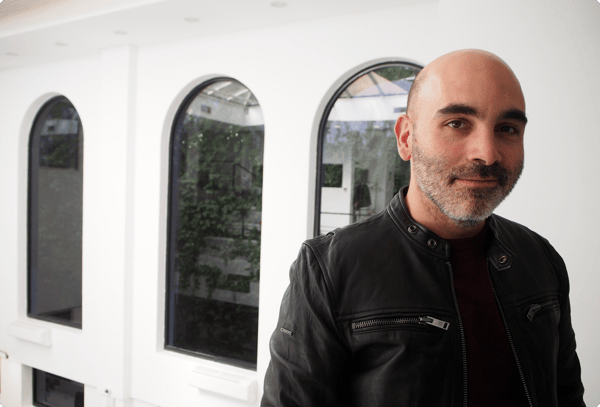In my articles, I love counting on people who know a lot more than me, because they give me a new perspective.
But, why am I telling you this? Because, originally, my intention today was to talk to you about how companies’ political decisions have a lot to do with the data we find in job offers, but I’m finally going to talk to you about the cultural system that rules the technical hiring market in Spain. The thing is that today, while talking to my coffee guest, I’ve realised that I agree with him on the fact that we’re talking about something much bigger than the specific policies of each company.
But I think I’m anticipating, and I haven’t even told you who I am meeting today, and that’s not how things should be done, let me introduce my guest first. Today, we’ll be having a coffee in a coworking space with David Bonilla Fuertes. In addition, in this post you will find some audio recordings of our conversation.
As you’ll see, I like you to hear the coffee maker in the background or the people surrounding us in these conversations. You may call it personal branding, or just that I want you to experience in the closest way what that conversation and coffee were like, so I recommend that you prepare your own.

David Bonilla, an influencer of the IT world
In case you don’t know him, David is quite a renown person in the IT sector and he counts on a very broad network and visibility, mostly thanks to his #Bonilista.
The #Bonilista is a newsletter that currently counts on almost 9.000 subscribers and where all Sundays without fail, David talks in-depth and gives his opinion on several issues that have to do with the IT and the development world.
I met David thanks to his articles, but there is much more than that behind him, like for example a yearly event called TarugoConf which is aimed at creating new business relationships and start-ups.
But, above all, the reason why David is the expert I would like to interview today, is Manfred a business the aim of which is to accompany the recruitment process of technical profiles. This project has introduced in Spain a new way of hiring based on individuals by moving away from the passive market based on publishing offers and receiving CVs.

<<< Find out the main conclusions of Susana Morcuende on the hiring of technical profiles >>>
Why are there so many job offers without a company name?
David is clear about it. This common practice has to do with how the recruiting market in Spain is currently and mostly structured. It is a system based on a kind of “The Hunger Games”, in which recruiters compete among themselves for finding candidates for the same position and where only one of them will get paid; the one who finally gets the final client to hire his/her candidate.
This is transparent for the final company, that is to say, the company is not worried about the fact that different people are looking for candidates on its behalf, and companies don’t even review the job description that will be published by each of the recruiters trying to find a candidate for a given position.
![]() David Bonilla talks about the work of the recruiter
David Bonilla talks about the work of the recruiter
The fact of indicating “Leading company in the sector” is a way to avoid competence from other recruiters in this system since, in the event that the company name was made public, other competitors would offer themselves to cover a given position.
Another of the bad effects being generated in this recruiting system David tells me about is that recruiters work towards quantity and not quality; the recruiter tries to get the highest possible number of candidates, the sooner the better, in order not to lose the opportunity against the rest of competitors.
Why are there so many job offers without a salary?
Regarding publishing or not the salary, David thinks that the fact of doing it or not depends on the policies of each company, and he tells me about the three most common cases:
-
The first one has to do with the power of information. The company knows what a candidate is paid (the candidate usually says it) but keeps the information of what the salary is to itself.
- The second one has to do with the fluctuating market price of salaries and the comparison we all do with the maximum salary we could be paid. This means that an employee who has been hired for a long time might not have a salary which is close to the maximum being paid at that moment in the market, so making public the new hiring salaries could generate conflicts.
- The third one is trying not to lose any hiring opportunities, especially the outstanding ones. Companies count on a given budget for hiring certain profiles, but if they come across an applicant who they think it is worth paying more for, they don’t want to miss out on the opportunity from the first moment on, which is usually the written offer.
This is the system but, which solutions does David tell me about?
![]() David Bonilla tells the secret to write a perfect job offer for technicians
David Bonilla tells the secret to write a perfect job offer for technicians
Who writes the offer? How does he/she write it?
Let’s leave the salary aside and talk about solutions, since Bonilla is suggesting one now on which I agree with him. This solution is to write different offers thinking of different kinds of candidates, but is this advice welcome? Which disadvantages has he come across when recommending companies to do it this way?
I ask Bonilla to focus a bit more on solutions when it comes to writing a job offer and he tells me that:
-
You see that writing a job offer is a headache for the company, starting from the moment in which they need to synchronise tasks and make all the offers look similar:
![]() David Bonilla explains the backend of a job offer
David Bonilla explains the backend of a job offer
- Writing offers is a complex skill that usually requires time, something which in the case of human resources employees is hard to find, since they are not usually specialised in recruiting. Even though it is also true that some companies are starting to count on this figure in their workforce (the recruiter), the normal thing to happen is that the human resources department doesn’t have time for writing offers, and, as a consequence, this task is finally entrusted to external recruitment companies.
So, what does Bonilla, as a programmer, look for in a job offer?
Bonilla is clear about all these things because he has experienced it from the other side. His technical experience is very broad, and he has also looked for technician jobs. I’m very interested in his point of view as a technician, so I ask him to answer my questions from that perspective now and tell me which things make him not apply to a job offer.
What I’m trying to prove with this experiment is very simple: I’m trying to show with very specific examples that it is essential to focus on the vital moment of each individual and on the individual itself. Bonilla answers and he gives me his opinion from the vital moment he finds himself at right now, in which he values time and the fact of wasting it.
![]() David Bonilla explains what is most important in a salary offer for a technician
David Bonilla explains what is most important in a salary offer for a technician
False beliefs from those companies hiring technical profiles
Let’s go a bit further and talk about those false beliefs companies have when it comes to wanting to hire technical personnel.
David tells me that these false beliefs can be summarised into:
- Not working hard on these processes, that is to say, trusting only passive recruiting without doing anything else, and hoping that the best CVs will just come in, which is something that doesn’t normally happen and, if it does, it is very rare. If to all this you add writing offers too fast and paying very little attention to this kind of processes, you may even come across spelling mistakes.
- Not allocating money to hiring technical profiles. David tells me that he sees companies that have no money allocated towards open positions in a market such as nowadays’, in which the supply is greater than the demand and, in order to stand out or reach candidates, it is completely necessary to allocate economic resources.
![]() David Bonilla tells what other factors move the technicians to sign up for an offer
David Bonilla tells what other factors move the technicians to sign up for an offer
- Not taking rotation into account: Most start-ups don’t even consider it and they even get to believe that they have a workforce from which nobody will leave. Something unreal. A rotation of the 10-20% of the workforce is normal, and nobody talks about that.
Passive recruiting culture
Let’s talk about the dominant recruiting culture in Spain, passive recruiting, and Bonilla’s view as the promoter of another model from his Manfred entrepreneurship.
Recruiting in a passive way consists of publishing a visible offer to which candidates will apply. David gives me some data of vital importance so as to understand why this kind of recruiting doesn’t work in the IT environment and in certain areas in Spain:
![]() The traditional way of recruiting does not work anymore
The traditional way of recruiting does not work anymore
He also tells me that, after the first shocking moment of not receiving CVs due to the market peculiarities we were talking about, comes the moment when they think of hiring a recruitment specialist, - a recruiter -, but they see it as “an expense they need to pay for, and not as an investment”, “a commodity” rather than something they need to take care of.
The close relationship as the model to face transaction
Now I would like to be able to transmit to you in the most veracious way the model based on relationships that Bonilla suggests together with Manfred because even I, myself, have dedicated some time to understanding his business, but I hadn’t grasped its value until today, that I’m talking to him face to face.
And the thing is that what happened to me was that I thought that it was a business in which a person accompanies you in your professional career in the shape of a coach, with a lot of transparency and receiving a percentage in return.
But that’s where I stood, I didn’t go further and the thing I was lacking, the useful base of the business, the one adding real value, is what I’m understanding right now. Let me add a longer audio recording, which is the one that has given me all the information I hadn’t understood yet and that has helped me love Manfred:
![]() It is vital to understand what technicians need
It is vital to understand what technicians need
Love and care, those needs you create by innovating
While talking to David I’ve seen a halo of light in the recruitment world in Spain. If he offers a new relationship model, I offer myself to educate companies in the cultural aspect and to teach them how to care for employees, even though we also need to say that there are recruiters who really care about the individual in contrast with the ruling general system, which is characterised by the lack of it. I’m starting to believe again, and I encourage you to look for new models if recruitment is really important to you, whether you are candidates or companies.
Because it’s true, technical recruitment in Spain is badly damaged in many aspects, and as an ex-developer it’s hard to say it but, we can’t complain all the time and then do nothing. That’s why I thank David for his initiative, and I hope that he has a lot of success in that change towards closer and more human relationships in the working environment because it is very necessary, since there are many working lives that are stumbling along or that are truncated because of the lack of care towards candidates and companies.
P.S.: The conversation with David has so much information that I’m keeping half of the interview for a second part. You’ll have to wail a little bit more, but I think it’s enough for today, now it’s time to broaden our horizons.



